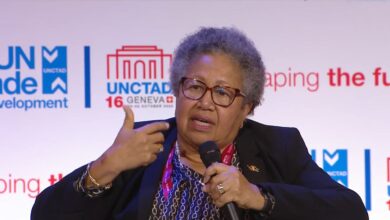(CARICOM Secretariat, Turkeyen, Greater Georgetown, Guyana) The Pan Caribbean Partnership Against HIV and AIDS (PANCAP) has received an additional 5 million Euro for the execution of a regional project on the prevention of HIV and AIDS in the Caribbean. With this new allocation, the financial support from the Government of the Federal Republic of Germany for CARICOM and the project “HIV and AIDS in the Caribbean” totals 21.5 million Euros.
On Tuesday, His Excellency Edwin Carrington, Secretary General of the Caribbean Community (CARICOM) and German Ambassador, to Trinidad and Tobago and the Caribbean Community. His Excellency Dr. Ernst Martens signed an additional agreement on financial co-operation in the field of HIV and AIDS prevention in the Caribbean. The agreement assures continued financing for an important regional project with CARICOM that began in 2004. This represents the third component of the Financial Co-operation Agreement between CARICOM and the German Government.
Speaking at the signing ceremony in Port-of-Spain, Trinidad and Tobago, Mr. Carrington noted that the significance of this expansion was that in addition to scaling up HIV prevention efforts among the most-at-risk population groups, including unhinged and marginalized youth, the rural poor, mobile groups and sex workers, the project now targeted the important and often under-sourced indigenous populations of Guyana and Suriname with innovative social and behavior change interventions. Under the new agreement, interventions directed towards improving the reproductive health of women, including their sexual rights would be implanted.
“The support from the Federal Republic of Germany is important as it fills an important gap and it helps to mainstream HIV prevention into the education, health, youth, gender and even cultural programmes and policies of CARICOM. It emphasizes the need for a multi-sectoral approach to reducing the spread of HIV, and most other preventable non-communicable diseases,” Mr. Carrington noted.
Additionally, he said support for HIV prevention had important implications for the Caribbean’s integration movement by increasing the health and well being of people. This, he said, was essential for sustaining a workforce capable of competing in the global arena. Dr. Martens said this project was part of the worldwide contribution of the German Government and its international partners in the fight against HIV and AIDS.
He added that while the people of Germany were interested in reducing infection rates they also wanted to help those living with the disease to ensure that they had access to anti-retroviral medication.
“The German Government is glad to co-operate with CARICOM as we feel that we should do whatever we can to support regional efforts against HIV and AIDS,” he said. One important aspect under the agreement is the expansion of beneficiaries under the new Co-operation Agreement beyond the original eight countries – Antigua and Barbuda, Belize, Dominica, the Dominican Republic, Haiti, Jamaica, St Maarten and St Vincent and the Grenadines to include Guyana and Suriname.
Germany has long standing co-operation with CARICOM in a number of programmes and projects. Among them is a project which promotes the Caribbean Renewable Energy Development Programme (CREDP). Since its start in 2004 the German Government has funded this project with a total amount of 6.75 million Euros.
Both projects reflect the policy of the German Government to establish and fund programmes that, apart from their substantive relevance and merit, support and foster the continuing process of regional integration worldwide and especially in the Caribbean.





